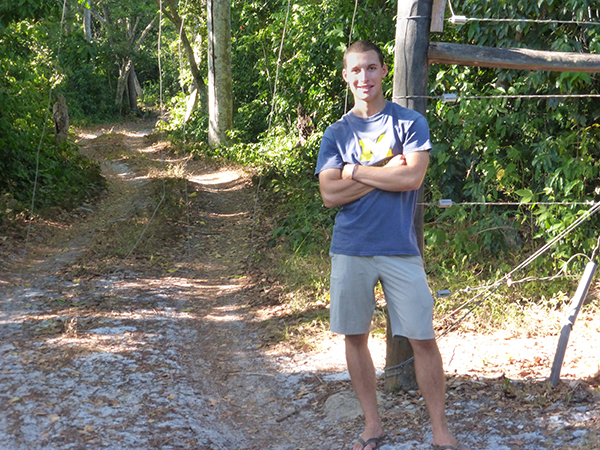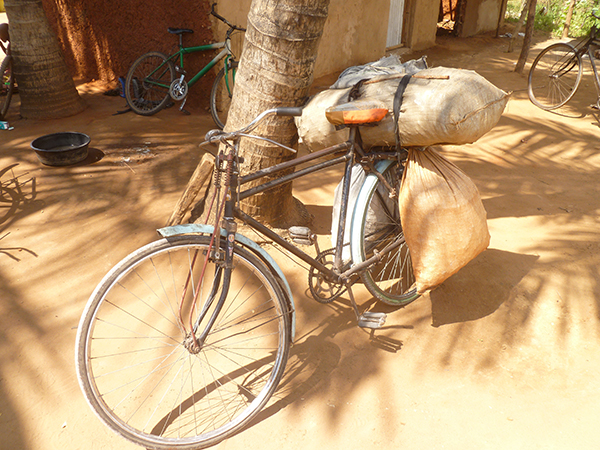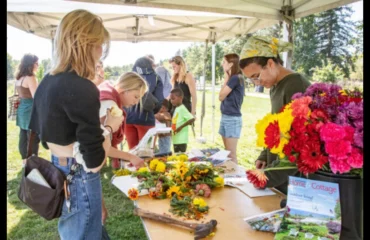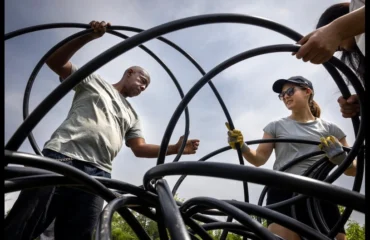Learning by doing in Africa
Zach Petroni believes that to truly know something, you have to experience it. So that’s why he spent some time working as a charcoal hauler in Kenya, loading huge bags of the fuel on a rusty fixed-gear bike and pedaling it 20 miles into town.
He’s in Africa as the first recipient of the Raoul Wallenberg Fellowship—a $25,000 award named after one of the University of Michigan’s most heroic alumni. The annual fellowship allows graduating seniors to carry out explorations, projects or activities anywhere in the world.
Petroni is studying how local people deal with conservation efforts in their own backyards. He got interested in the issue when he went to Kenya during his junior year for a three-week course with the Graham Institute.
“The course was really formative in my thinking,” said Petroni, who graduated last year with a bachelor’s degree from the Ford School of Public Policy. “It really opened my ideas to conservation and taught me the value of critical inquiry.”
In the West, conservation is often viewed to be a positive, moral effort—saving a forest or protecting a herd of elephants, Petroni says. But for the local population, it often means losing a home, farmfield or job that leads to a deeper plunge into poverty.
“Historically there has been a lot of forced resettlements,” he said. “Worldwide, it has been a violent process, where government forces moved people under the threat of force and violence.”
As he travels in Kenya, Petroni can afford to stay in guesthouses or budget hotels. But he says this would prevent him from better understanding how life is really lived in Kenya. So he stays with families instead.
He arranges home stays by asking friends if they know anyone who would be willing to host him for a few days. He has lived with subsistence farmers, a primary school teacher and a group of people who tap palm wine.
“When I find a family, I’ll go out with my tent and a bag of food and say, ‘I’m here. Don’t sugar coat anything. I want to do what you do for the next week.’ That’s the homestay,” he said.
It’s something Wallenberg would have done. As an undergraduate from Sweden studying at U-M in the 1930s, he famously dove into his new life in America, making a variety of friends and exploring the country on epic hitchhiking trips.
In a letter to his uncle, Wallenberg said, “When you travel like a tramp, things are totally different. You are in intimate contact with new people everyday.”
No doubt, the experience helped sharpen the people skills Wallenberg needed later in life when he was a diplomat during World War II in Hungary, using safe houses and special passports to save tens of thousands of Jews from the Holocaust.
Before the fellowship, Petroni said he read Wallenberg’s biography and was inspired by the way the Swede traveled. He views the fellowship to be both a “living and learning experience.”
It was a chance encounter that led Petroni to the temporary job hauling charcoal. He was walking with a friend in a rural area on the central coast of Kenya, about an hour and a half from Mombasa, the country’s second-largest city.
His friend introduced him to another friend, a charcoal hauler who Petroni simply calls John to protect his privacy. John was different from many other Kenyans, who were generally welcoming and polite but also skeptical about the motives of strangers from the West. They’ve met too many do-gooders who come and go, mostly seeking to benefit themselves in some way.
“From the second I met him, I could tell John was an extremely kind man with an immense heart,” Petroni said.
John invited Petroni home and the student stayed with his family for four days in a mud-clay house with a corrugated steel roof. The living space for the family of eight was as big as three dorm rooms. Meals usually included corn meal porridge called “ugali” with boiled greens and a bit of fish or chicken.
“I got to see firsthand and experience his struggle and how he does it in good faith, with nothing but love in his heart and for everyone else,” Petroni said. “He makes on average 800 or 1,000 shillings ($9 or $11.50) a day and he’ll send 500 shillings of that to his son everyday to pay for his school fees.”
John, in his late 50s, started hauling charcoal after he got laid off from a dairy cooperative, where he had worked for 10 years. The charcoal is bigger than the briquettes used in American barbecue grills. It’s made from logs that are broken up into large chunks and stuffed into bags that hold 110 pounds. John would tie four of the bags on his bike and deliver it 20 miles into town. Half the way is uphill.
Petroni hauled charcoal with John for two days, and the work provided valuable insights for his research. Much of the charcoal wood came from a protected forest, so John was technically involved in a network of illegal activity that the government and international organizations want to crack down on.
Through John, Petroni was able to meet the other links in the charcoal chain, including the producers, and this enabled him to gain a more comprehensive understanding of the importance of charcoal to those in the area. One was a young woman in her late 20s whose husband died, leaving her with three children and no other way of making an income. She was selling the bag of charcoal to buy the day’s food for her children. Another producer was the pastor of a church. His wife did it to make some extra money for the holidays.
“I gained an appreciation for not only John, but all like him who daily face struggles that would tax many Westerners to their extreme physical and emotional limits, and are able to find joy, love and peace in their lives,” he said.
Saying it was a learning experience almost doesn’t do it justice,” Petroni said. “It was a borderline spiritual, metaphysical experience. Honestly, just with everything I got from being with John and doing what he does and being with his family. I’m not trying to romanticize it. There’s nothing great about what he does. If he has the option, he would do something else. The only reason he does it is because he wants to put all of his children through school.”
The underlying theme of Petroni’s Wallenberg proposal was to question conservation in a firsthand way. His fellowship is almost over, and he still hasn’t reached a conclusion.
“The more time I spend, I don’t think there’s a black or white conclusion. It’s all just shades of gray,” he said. “Conservation is very place specific. In one place it can be this. In another place it could be the polar opposite. I just think my understanding of conservation has become more nuanced.”




